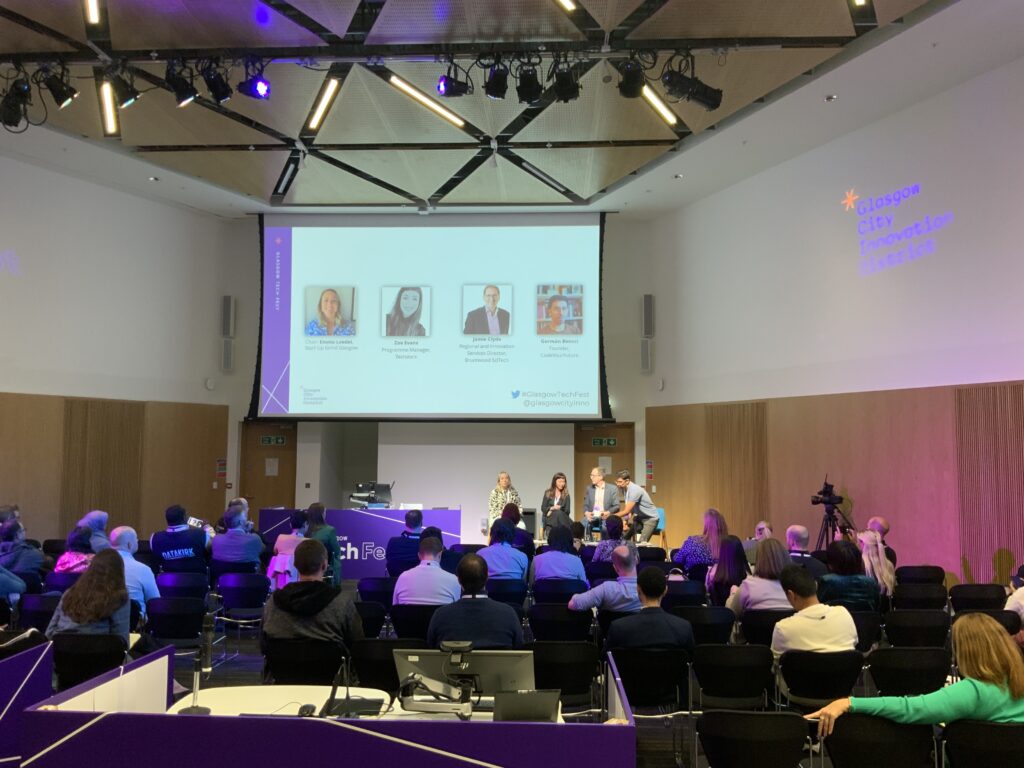A leading tech sector investor has said funding for the tech sector in Scotland is based on “historic banking structures” that are not designed for modern digital startups.
Alison Porter of Janus Henderson, a British-American global asset management group, said more dynamic funding models are needed to support ambitious founders looking to scale.
She called for an Amazon-style ‘marketplace’ which better connects entrepreneurs to venture capitalists and for the creation of a more “dynamic and fluid” system.
“I’d love to see some kind of marketplace,” said Porter, speaking at Glasgow Tech Fest on Wednesday. “I think a lot of the infrastructure we around funding just now is based on historic banking structures and it can take a long time, it’s not fluid.
“And I would love to see to have a more fluid funding system, where investors can spread the risks more evenly. And founders can get access to that capital and have some visibility.
“And I think it’s being realistic about valuations when you’re seeking investment, but I also think it’s really providing a more dynamic marketplace, almost like an Amazon marketplace for funding where you can post what you do, and see who is out there, and what venture capitalists you would like to approach.”
Porter, an economics graduate from the University of Strathclyde, raised the points in response to a question about Scotland, but related them more widely to Europe, as well.
She said that startups often find it slow to get up and running, but once they start to take off, and doing well, founders find accessing capital “really difficult”. She said that a marketplace would help towards creating a more ‘virtuous cycle’ and sustaining an ecosystem.
She acknowledged the recent demise of Silicon Valley Bank in the US has made the global investor community a “little bit more cautious”, in terms of where the market is going. But she said there is now a $200bn cash pile “sitting on the sidelines” and waiting for allocation by the global venture capitalist (VC) community.
In terms of tech trends, however, she said that there is a real appetite for investment into AI, as demonstrated by the $10bn investment from Microsoft into Open AI, the developer behind ChatGPT; she said a lot of firms ‘overbuilt’ some of their infrastructure and as they pare that back, there will be more opportunities for startups. And she predicted that fintech companies closing the loop of some of the transactional purchasing problems that persist in business will continue to see growth. She gave the example of direct purchasing from social media to streaming platforms and the integration of payment technologies.
For the big tech companies she said the Microsoft investment into Open AI is likely to be a trend across the likes of Amazon, Alphabet and Meta, who are going to have to look for other funding routes to spend their surpluses. Alphabet has a reported cash pile of over $100bn and Meta over $60bn, for example.
The conference at the Technology & Innovation Centre also heard from some of the tech ecosystem players who are transforming the sector north of the border. Jamie Clyde, director of innovation services for BruntWood SciTech, the property company responsible for the £60m redevelopment of the Met Tower, said that he was “very excited” to be landing in the city.
He characterised tech ecosystems as going through several different and distinct phases before they reach maturity. At the first stage, cities, in this context, will be looking at trying to establish an innovation agenda, by creating incubators and accelerators for startups to inhabit, as well as trying to keep talented students from leaving. The second is about supporting the emergent startups to become scaleups, starting to create real economic value and jobs, attracting VC support and international founders. And then stage three he characterised as being when scaleups start to become or attract enterprise business. The final phase is when a city becomes mature and it is necessary to protect its development owing to the risk that its success may cause an “overheating”, for example in sustaining the demand for local housing, infrastructure, space or talent.
Clyde said: “So across the UK, cities are really spread across that continuum. So there’s no right answer as to what’s the ideal ecosystem, it’s what’s ideal for the level of maturity that ecosystem is in. And I think I would put Glasgow in that second phase, but with eyes on the on the third phase, now, which is very interesting. Manchester, I think is in that third phase, and it’s starting to attract serious investment from enterprises; I think one of the key factors that rolls from that second to third is really the crowdfunding of investment.”
